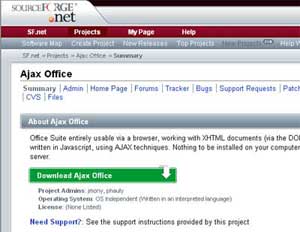Not only does it breathe new life into outdated desktop applications with vibrant, interactive web versions, technologies like AJAX also revitalize an ambition once considered a pipe dream: replacing Microsoft Office.  The emergence of numerous popular web services, most notably Google Maps, has made AJAX techniques famous within the IT community. Today, dozens of companies are employing this technique to create web versions of various desktop applications, ranging from word processors to project management programs.
The emergence of numerous popular web services, most notably Google Maps, has made AJAX techniques famous within the IT community. Today, dozens of companies are employing this technique to create web versions of various desktop applications, ranging from word processors to project management programs.
However, don’t assume that these applications are merely online replicas of Microsoft Office; many of them are focused on publishing and sharing information across the web.
The original AJAX technology was developed by Microsoft in the 1990s, based on JavaScript and various other web standards. It wasn’t until recently, with the official introduction of the term AJAX in February, that most developers and businesses seized the significant opportunities it presents.
Google’s use of AJAX has demonstrated how web applications can fiercely compete with existing desktop applications, in terms of appearance, performance, and user comfort. Many developers believe that AJAX applications will eventually infiltrate nearly all computers in existence.
In fact, interactive web pages built with multimedia tools like Macromedia’s Flash and Flex have been sporadically appearing for several years. Of course, Flash and Flex will continue to exist for more complex, sophisticated tasks, but for simpler tasks, AJAX proves to be much more suitable.
Moreover, AJAX paves the way for the proliferation of advertising or subscription-based services as their primary revenue sources. This is a stark contrast to the traditional desktop software model, where users had to pay upfront to purchase and install a product on their computers.
Microsoft, the absolute dominator in the desktop software market, is now racing – albeit a bit late – into the realm of web-based application services. Kicking off this campaign is Live.com, an online service that evolved from MSN. Many services within Live.com, such as Hotmail (later renamed Windows Live Mail), have undergone significant transformations thanks to AJAX technology.
AJAX Office?
The rapid development of AJAX, coupled with Microsoft’s enthusiastic attitude towards this technology, raises the possibility of Microsoft Office being replaced.
Google has decided to “assign” some of its top employees to the OpenOffice open-source project, leading to speculation that the search giant may offer a web product suite in the near future.
On the other hand, Microsoft has not announced any plans to develop a complete web version of Office. Last month, the company indicated that it would launch a new service called Office Live aimed at small businesses looking to manage customer accounts. However, this service can only supplement, not replace, Office.
Aside from Google, it seems no smaller company dares to dream of overthrowing Microsoft Office. But if you ask whether Microsoft can rest easy with its best-selling office suite, the answer would be a resounding “no, no, and no!”
Cầm Thi

















































